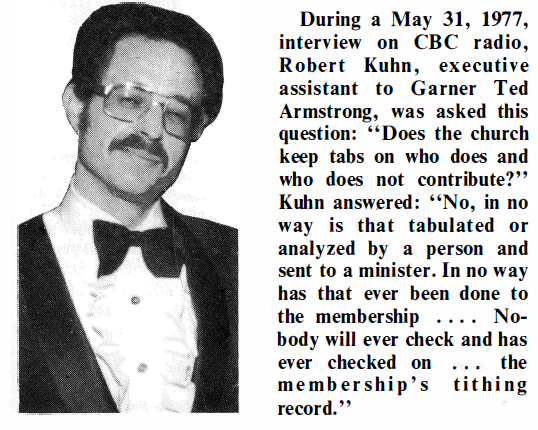Shortly before leaving my position as Director of Research for the Garner Ted Armstrong television program, I was given the responsibility of gathering all the research material I could find on the subject of “tithing” for Dr. Charles Dorothy’s Doctrinal Research Team. In the process of completing this assignment, two things occurred which began to cause the administration to reevaluate my unquestioning loyalty to the Armstrongs.
(1) Mike Holman, a supervisor in the Data Processing Department, quietly informed me that he had been directed to run another extensive tithing check on church and college employees. A person’s tithing record was being used as an index of his loyalty to the Armstrongs and of his “conversion to Christ.”
We had always been solemnly assured, in sermons and church literature on “tithing,” that the records of one’s donations were inviolate and confidential-that giving was something deeply personal between an individual and God.
My wife and I had learned, approximately eight months before this event, that the tithing records were exploited for numerous purposes. We decided at that point that we were not going to allow ourselves to be the willing recipients of this kind of invasion of privacy, so we sent in our tithes and offerings in such a way as not to show up on the computer. It was also at this time that we began to donate a portion of our tithes and offerings to charitable causes. Anyway, the net effect was that Mike Holman’s computer printout showed no record of our tithes or donations.
(2) During this same “tithe-check” period, Robert Kuhn informed me that he was under intense administrative pressure to terminate Harry Eisenberg, one of my employees, because he was not tithing and had been doing some “talking” to others about his research on tithing. Harry was one of Robert’s close friends, and Robert was asking me to structure some type of “budgetary layoff” in my department so he could discreetly get rid of Harry without a hassle. I told Robert that I would not fabricate a reason to terminate Harry because he was a highly competent employee who had done excellent work for me. Robert called me at least twice a week during the next month begging, urging, demanding, and pleading that I terminate Harry for him because the administrative pressure on him was getting so intense. My basic response to him was that he was my up-line supervisor and he would have to be responsible for terminating Harry if it was going to happen because I was going to stand in his way. I felt that the responsibility I had to protect my employees from this type of institutional harassment offset my organizational responsibility to simply click my heels and obey orders. I also told Robert that I had discussed Harry’s situation with the current managing editor of The Plain Truth (Harry’s former supervisor), who had originally asked Harry to research the subject of tithing, and it was our mutual feeling that tithing was a personal thing between an individual and God-not a criteria of employment and something to be related to tangible job skills. Robert said he personally agreed, but he was being forced to get rid of Harry-the pressure was just too intense. Finally, Robert terminated Harry over my objection and the “Reason for Termination” blank read, “budgetary cutback and layoff,” which had become the standard official cosmetic statement for religious layoffs on personnel records. If you wish to read Harry’s own story, see Ambassador Review, June 1976, “Executive Action,” p. 22.
-Olin Degge

